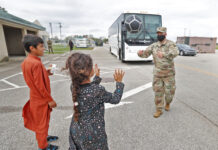BANGKOK — Ethnic Karen guerrillas said they captured a Myanmar army base Tuesday in what represents a morale-boosting action for those opposing the military’s takeover of the country’s civilian government in February.
A spokesman for the Karen National Union, the minority’s main political group seeking greater autonomy from Myanmar’s central government, said the group’s armed wing attacked the base at 5 a.m. and burned it down just after dawn.
Casualty figures were not yet known, the KNU’s head of foreign affairs, Padoh Saw Taw Nee, said in a text message. There was no immediate comment from Myanmar’s military government.
The KNU, which controls territory in eastern Myanmar near the border with Thailand, is a close ally of the resistance movement against the military takeover that ousted the elected government of Aung San Suu Kyi.
Video shot from the Thai side of the border showed flames rising from the government position on the banks of the Salween River, amid the sound of heavy gunfire. The river marks the border with Thailand.
A report by the Karen Information Center, an online news site, quoted an unnamed villager on the Thai side of the river saying he saw seven government soldiers trying to flee the camp, which is opposite Thailand’s Mae Sam Laep village.
Fighting between the KNU’s armed wing, the Karen National Liberation Army, and Myanmar’s military has been intense since February.
Myanmar jets have bombed and strafed Karen villages and its army has deployed fresh battalions to the area, in possible preparation for a large-scale offensive.
Up to 25,000 villagers have fled their homes and are hiding in jungles and caves, according to the Free Burma Rangers, a humanitarian aid group that is active in the area.
In response, the KNLA has kept up guerrilla attacks on Myanmar patrols and bases. The KNU has also given shelter to activists against military rule who have fled the government’s crackdown on the resistance movement in the cities.
There is a similar situation in northern Myanmar, where the Kachin minority has claimed to have captured several government outposts and been the object of air attacks.
The Karen and the Kachin are two of the bigger minority groups that have been seeking greater autonomy for decades, during which there have been periods of armed conflict punctuated by ceasefires.
The city-based resistance movement against the current ruling junta has wooed the ethnic guerrilla groups in hopes that they can form a federal army as a counterweight to the government’s armed forces. A parallel National Unity Government established by elected lawmakers prevented from taking their seats by the army has appointed representatives of several minority groups to ministerial posts.



